
Films, TV, and Theatre

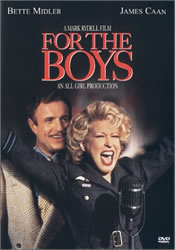 | |||
|
| | ||
For
the Boys (1991)
Romantic melodrama starring Bette Midler and James Caan as a song-and-dance team entertaining the troops from World War Two to Vietnam. Stars: Bette Midler, James Caan, George Segal, Patrick O'Neal, Melissa Manchester Director: Mark Rydell TV Guide
As the film opens, smooth young TV executive Jeff Brooks (Arye Gross) is sent to escort veteran entertainer Dixie Leonard (Midler) to a lavish televised awards presentation honoring Leonard and her partner of nearly 50 years, the legendary Eddie Sparks (James Caan). Brooks is informed by Dixie, now a feisty octogenarian, that she has no intention of appearing on the same stage as Eddie, despite the honor. Quickly assessing the situation, Brooks earns Dixie's confidence by cannily questioning her about her turbulent life and career. The year is 1942 and, thanks to the help and clout of her show-biz agent uncle, Art Silver (George Segal), eager entertainer Dixie Leonard gets her first big break when she's offered a spot in England entertaining the GIs for the USO. The star with whom she is to work is none other than show biz great Eddie Sparks, renowned career-maker ... and skirt chaser. Once onstage, Dixie is an instant success, thanks to her vibrant personality, swinging voice and double entendres, all to the chagrin of Eddie. Offstage, Eddie informs Dixie that she won't work for him again. Though all tough-as-nails brass on the outside, inside Dixie is all heart and quite vulnerable, and she's devastated by Eddie's news. However, the starmakers behind the scenes come to her rescue and, realizing the incredible impact Dixie has had on the boys, convince Eddie to team up with her. Dixie's private life, meanwhile, is primarily focused on raising her small son and awaiting the safe return of her husband, a GI fighting in North Africa. Soon after a brief visit with her husband--arranged by Eddie--Dixie is widowed and never marries again. Instead, she devotes her life to her son and show business. While the Sparks-Leonard pairing flourishes onstage, seemingly in perfect harmony, offstage it is a battle royale. Still, their professional union continues through World War II, a successful TV series, and the Korean conflict. The love-hate relationship between Dixie and Eddie boils over into genuine bitterness on Dixie's part when Eddie betrays Uncle Art, now his top comedy writer. It's the McCarthy era and Art Silver has been blacklisted. Fearing reprisals, Eddie fires Art and for this Dixie never forgives him. Despite
this, Dixie, now a successful nightclub owner, allows herself to be coaxed by
Eddie into coming out of While it is unquestionably loud, brassy, glittering and vulgar, FOR THE BOYS fails to be as potent, meaningful or as focused as it should have been and the overall effect is a tedious, rambling story that finally grinds to a halt during the final Eddie Sparks-Dixie Leonard reunion sequence. Apparently afraid to buck the current thought that musicals don't make it at the box office, director Mark Rydell chose instead to keep the action moving at all times. This means that most numbers are seen only in bits and snatches while some other--much less interesting--bits of manipulative backstage business are taking place, such as which TV monitor to pick Dixie and Eddie up on, etc. What we have now is a show biz chronicle that often lacks the coherence it should have at all times. True, the concept of two superstar entertainers who are a smash as a team but whose private lives are all messed up, is very clear. However, the film's preoccupation with Eddie's supreme selfishness and Dixie's bombastic brassiness tends to get in the way of story progression to the point where there is blessed little time to appreciate the setting of any given episode--the exceptions being the early sequences entertaining the troops in 1942 and the horror of Vietnam. Then there's the problem of Caan, a fine actor horribly miscast as Eddie. Sparks is described as a superstar song-and-dance-man and comedian, a seeming combination of Bob Hope, Al Jolson and Fred Astaire, but we're never given a full-fledged demonstration of his amazing talents. Caan, although splendid in his offstage moments, lacks the charisma to effectively convey Eddie's tremendous appeal.
FOR THE BOYS truly shines when Bette Midler is permitted to perform uninterrupted, unfortunately all too rare a circumstance. The few musical numbers Midler, in a role patterned after the life and career of Martha Raye, is allowed to do justice to include a previously unheard Hoagy Carmichael-Paul Francis Webster song, "Billy-A-Dick," along with the haunting Johnny Mercer-Harold Arlen standard, "Come Rain or Come Shine," plus an all-to-brief performance of the energetic "Stuff Like That There" by Jay Livingston and Ray Evans and, finally, the Lennon/McCartney classic, "In My Life." Midler has definitely been short-changed here. She is a unique and special performer whose way with a song is dynamite and, perhaps, if this film had much more footage devoted to what Midler does best--singing upbeat, snappy tunes and emotion-charged torch songs--audiences would have taken to FOR THE BOYS much more than they did. (Some violence, profanity, adult situations.) Variety
Staff Duane
Byrge, Hollywood Reporter The best part of ''Boys'' is, well, the girl herself, Midler as Dixie, a smart-talking, smooth-singing USO entertainer shot straight to fame by her World War II performances. This Dixie, as you'd guess, is no wallflower: She's a smart, sassy, Mae West-type dynamo who not only sees the big picture but has got the moxie to kick in the pants anyone who can't see beyond their own self-interest; in this case, her senior song-and-dance partner, Eddie Sparks (James Caan), who's never quite tapped into the notion that World War II, the Korean War, Vietnam and all other ''limited engagements'' were not just mere backdrop to the main event, namely his patriotic performances for the troops. While it's tempting to blast off a 21-popcorn-box salute to the filmmakers for attempting to tell a compelling personal story through the prism of the last 50 years of U.S. history, it's discomforting to view wholesale sequences that reverberate with about as much depth as a Desert Storm victory parade. For the most part, namely the personal story segments, as Dixie and Eddie hit their high notes and scrape their bottoms, screenwriters Marshall Brickman, Neal Jimenez and Lindy Laub's script rings true, snapping with energetic humor and picking up the colors and uncertainties of the different times. Unfortunately,
this ambitious film is weighted down by its over-bulky, 145-minute frame; director
Mark Rydell, Despite ''Boys' '' bloated nature, it's full of oomph, namely Midler, who struts her considerable stuff to the staccato-steppin' max. While she's at her funnest when dropping bawdy bombs on all the stuffed shirts, Midler's acting range is clearly as wide as her vocal range. The dark torment of Dixie's waning years, when she feels she's lived beyond her time, are deeply touching -- a testament to Midler's capacity to reach down and get to her character's low notes. Caan, while somewhat uncharismatic as the young Eddie Sparks, similarly pulls off a solid performance: Caan reveals the wondrous, as well as the hideous, components to this superficial showman's successes. Lending solid support is George Segal as the duo's brainy, underappreciated writer. In
this big-bunting production, technical contributions are generally superior, with
bars and stripes to costume designer Wayne Finkelman for the cross-all-wars threads
and to composer Dave Grusin for the big-band blasts. Roger Ebert
Bette Midler stars as Dixie Leonard, a singer who is plucked from semi-obscurity at the outset of World War II and given her big break: A USO tour of Europe with Eddie Sparks (James Caan), a song-and-dance man who's a famous star. Their first time on the stage together, Dixie steals the show, Eddie tries to fire her, and they're off and running. Through thick and thin - North Africa, the Korean war, television, McCarthyism, Vietnam - they fight and make up while the world applauds, and finally there's a climax on a live TV awards show, where Dixie, ageless, and Eddie, 91 and looking like Little Big Man, kiss and make up. The structure of the screenplay is as old as the hills. The movie opens with a young producer on his way to Dixie's house to pick her up for the awards show. She refuses to appear on a stage with "that sonuvabitch Eddie Sparks," the producer coddles her, she lights a cigarette and pours herself a drink, and tells the kid her whole life story. What's curious about the flashbacks in "For the Boys" is that most of them are angry or depressing, and yet the movie doesn't establish the dramatic credentials to be so somber. The first USO musical number is a success, with Bette trading risque repartee with Caan and then belting out a loud number and a ballad. But from then on, the enjoyable moments are few and far between. One curiosity: Although Eddie Sparks is intended to be a superstar on the level of Bob Hope, he never has a single moment in the film when he reveals the talent needed to be onstage at all. Even that first USO performance contains an enormous oversight: We apparently see the entire show (Eddie's entrance, intro of Dixie, her first song, power failure, her second song by flashlight, big exit) but apart from the unscripted repartee before her first song, at no point during the show does Eddie actually perform. Is
this because all the big numbers were assigned to Midler? I think the problem
is deeper than that: The Eddie and Dixie grow famous for breaking up, most notably during a hit TV show in 1950, after Eddie fires his writer because he may be a communist sympathizer, and Dixie walks out. The two do not speak until the 1960s, when Eddie seduces Dixie into a Vietnam tour with the promise she can see her son, now a military officer, on the battlefield. The outcome of that reunion is not happy, but nothing on the screen indicates why they then again stop speaking for another 25 years. Maybe what it all comes down to is that I didn't like Eddie and Dixie separately or together, and when Bette Midler wasn't singing there was little in the movie to entertain me. A showbiz biopic is one thing (and Midler made a good one, "The Rose"). But a movie with the ambition to deal with serious and depressing subject matter needs more dramatic substance, instead of perfunctory arguments punctuated by unconvincing reunions, remembered by a bitter old woman. The climactic awards ceremony itself, by the way, needs to be seen to be believed. Movies are always making the mistake of using dialogue that tells us how much time is left. Then we think about the time, too. At one point, Eddie and Dixie have "five minutes" until they have to go onstage, so they have a long argument. Later, a brief acceptance speech turns into a long-winded speech, followed by an impromptu sketch. It's touching, all right, but on live TV the show would have been off the air before Dixie ever appeared onstage. Sky Movies
| |||
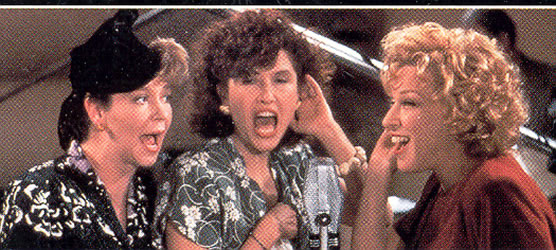 A
blatantly contrived yarn about the trials and tribulations of two legendary USO
entertainers, FOR THE BOYS was tailor-made for the myriad talents of the Divine
One herself, Bette Midler. She's given multiple opportunities to emote, tell dirty
jokes, emote, kick up her heels, emote and finally metamorphose into a full-scale
pop culture tragedienne. While Midler's multitude of fans may wax enthusiastic
over this spectacularly ambitious period saga, the average viewer will find FOR
THE BOYS a very long sit.
A
blatantly contrived yarn about the trials and tribulations of two legendary USO
entertainers, FOR THE BOYS was tailor-made for the myriad talents of the Divine
One herself, Bette Midler. She's given multiple opportunities to emote, tell dirty
jokes, emote, kick up her heels, emote and finally metamorphose into a full-scale
pop culture tragedienne. While Midler's multitude of fans may wax enthusiastic
over this spectacularly ambitious period saga, the average viewer will find FOR
THE BOYS a very long sit.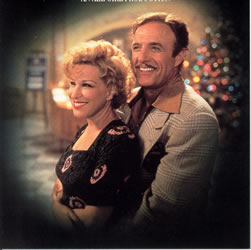 retirement to appear with him once again entertaining the troops, this time in
Vietnam. The main attraction for Dixie is the fact that a trip to Vietnam will
reunite her with her estranged son Danny (Christopher Rydell), a GI. During their
performance, the Viet Cong attack and Danny is fatally wounded, dying in his mother's
arms. Traumatized by the shock and horror of this bloody incident, Dixie permanently
retires from the stage, vowing never to work with, or contact, Eddie again.
retirement to appear with him once again entertaining the troops, this time in
Vietnam. The main attraction for Dixie is the fact that a trip to Vietnam will
reunite her with her estranged son Danny (Christopher Rydell), a GI. During their
performance, the Viet Cong attack and Danny is fatally wounded, dying in his mother's
arms. Traumatized by the shock and horror of this bloody incident, Dixie permanently
retires from the stage, vowing never to work with, or contact, Eddie again.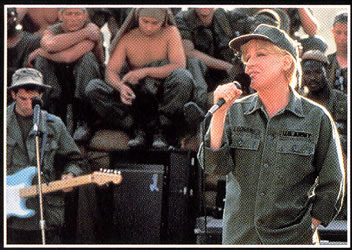 Finally,
and this is probably the film's worst moment and greatest single flaw, there is
the blatant contrivance of having Dixie perform on the very day and at the very
spot where her son is mortally wounded in Vietnam. Christopher Rydell's death
scene in Midler's arms--anguish registering all over her face--just doesn't work
because it makes the viewer too acutely aware that he is being manipulated by
yet another excessively executed plot point.
Finally,
and this is probably the film's worst moment and greatest single flaw, there is
the blatant contrivance of having Dixie perform on the very day and at the very
spot where her son is mortally wounded in Vietnam. Christopher Rydell's death
scene in Midler's arms--anguish registering all over her face--just doesn't work
because it makes the viewer too acutely aware that he is being manipulated by
yet another excessively executed plot point.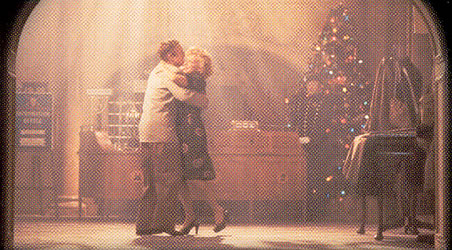 like a dirigible in a Thanksgiving parade, festooned with patriotic sentiment.
Ambitious effort spans the 50-year relationship of two USO entertainers (Bette
Midler and James Caan) whose song, dance and innuendo carries them through three
wars. Allegedly a 'love story' between two difficult people who are each married
to others, pic suffers from the couple's lack of electricity.
like a dirigible in a Thanksgiving parade, festooned with patriotic sentiment.
Ambitious effort spans the 50-year relationship of two USO entertainers (Bette
Midler and James Caan) whose song, dance and innuendo carries them through three
wars. Allegedly a 'love story' between two difficult people who are each married
to others, pic suffers from the couple's lack of electricity. 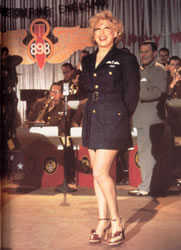 ''For
the Boys'' should primarily play for the girls. This big, fluffy, red-white-and-blue
Bette Midler blazer should strut out with a snazzy boxoffice gait for 20th Century
Fox. While this All Girl Productionwill likely dazzle enough mature girls to carry
it to a ''Beaches''-level boxoffice tide, its somewhat soapy constitution and
its often shallow sweep of the last 50 years of U.S. war and social history will
swamp many viewers.
''For
the Boys'' should primarily play for the girls. This big, fluffy, red-white-and-blue
Bette Midler blazer should strut out with a snazzy boxoffice gait for 20th Century
Fox. While this All Girl Productionwill likely dazzle enough mature girls to carry
it to a ''Beaches''-level boxoffice tide, its somewhat soapy constitution and
its often shallow sweep of the last 50 years of U.S. war and social history will
swamp many viewers.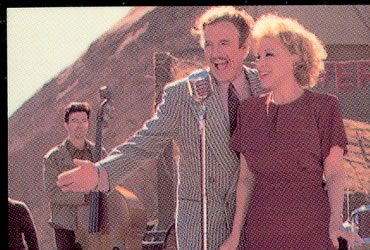 while wonderfully pinpointing many grand-scale particulars in his scope, also
allows the film to wallow in redundant, superficial sap.
while wonderfully pinpointing many grand-scale particulars in his scope, also
allows the film to wallow in redundant, superficial sap.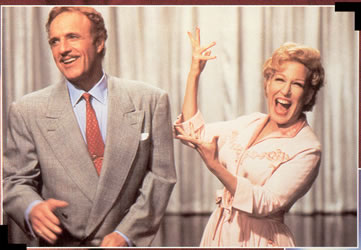 "For
the Boys" tells the endless story of a showbiz partnership that lasts 50
years, during about 35 of which the two partners are not speaking. That wouldn't
be so bad if they had any chemistry when they are speaking, but this movie is
cold and distant when it isn't contrived, and by the end not even the manufactured
emotions ring true.
"For
the Boys" tells the endless story of a showbiz partnership that lasts 50
years, during about 35 of which the two partners are not speaking. That wouldn't
be so bad if they had any chemistry when they are speaking, but this movie is
cold and distant when it isn't contrived, and by the end not even the manufactured
emotions ring true. 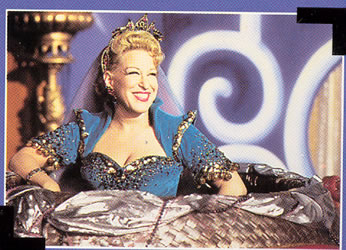 filmmakers
never knew who Eddie or Dixie really were. That's why we don't know which side
to take in the tortured subplot, involving Dixie's son, Danny, who Eddie loves
as if he were his own. Eddie has a wife and three daughters of his own but does
not love them at all, for reasons not cited other than the wife's alcoholism (established
with one big backstage glass of booze, in a role limited to two dozen words).
filmmakers
never knew who Eddie or Dixie really were. That's why we don't know which side
to take in the tortured subplot, involving Dixie's son, Danny, who Eddie loves
as if he were his own. Eddie has a wife and three daughters of his own but does
not love them at all, for reasons not cited other than the wife's alcoholism (established
with one big backstage glass of booze, in a role limited to two dozen words).
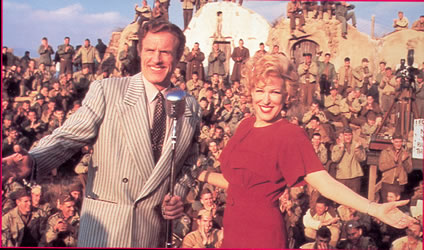 There's
too little patter, singing and dancing in this Bette Midler vehicle which casts
the dynamo dame as an entertainer who, through her partnership with another, finds
herself frequently involved in taking part in shows 'for the boys' at war. It
begins well - the first 30 minutes are hugely enjoyable - but grows increasingly
heavy as it (and the wars) go on. It might have been better, in fact, if the scenario
had just been limited to one war, the Second World, which would still have afforded
enough tragedy and reality - the loss of Midler's husband, the bloody introduction
of the touring troupe to real war - to spice the mixture up without making it
too lumpy. As it is, the old age make-up that results from making this a 50-year
saga merely makes Caan and Midler (who never really suggest, on stage, a legendary
partnership) look like troglodytes. The ending touches the right emotional chords
for audiences still with the characters after such a long haul.
There's
too little patter, singing and dancing in this Bette Midler vehicle which casts
the dynamo dame as an entertainer who, through her partnership with another, finds
herself frequently involved in taking part in shows 'for the boys' at war. It
begins well - the first 30 minutes are hugely enjoyable - but grows increasingly
heavy as it (and the wars) go on. It might have been better, in fact, if the scenario
had just been limited to one war, the Second World, which would still have afforded
enough tragedy and reality - the loss of Midler's husband, the bloody introduction
of the touring troupe to real war - to spice the mixture up without making it
too lumpy. As it is, the old age make-up that results from making this a 50-year
saga merely makes Caan and Midler (who never really suggest, on stage, a legendary
partnership) look like troglodytes. The ending touches the right emotional chords
for audiences still with the characters after such a long haul. 